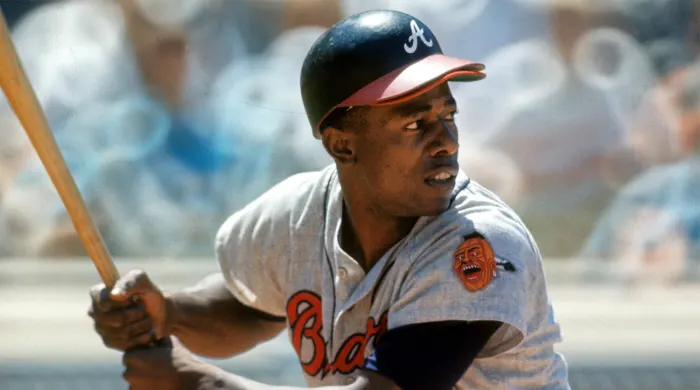
In the annals of baseball history, few names resonate with the impact and significance of Hank Aaron. Beyond his legendary feats on the field, Aaron’s journey as an Black player during a tumultuous era of racial segregation and civil rights struggles defined his legacy as much as his athletic prowess. His contributions to the game transcend statistics, embodying the fight for equality and the breaking of racial barriers in America’s favorite pastime.
Born in a segregated Mobile, Alabama, in 1934, Henry Louis “Hank” Aaron faced the harsh realities of segregation-era Jim Crow laws from a young age. Despite the societal constraints of the time, Aaron’s passion for
baseball was unwavering.
His journey to the major leagues was fraught with a multitude of challenges, starting in the Negro Leagues with the Indianapolis Clowns before making the massive leap to the Major League Baseball (MLB) with the Milwaukee Braves in 1954.
Aaron’s entry into the majors was a testament to his extraordinary talent and a sign of slowly changing times, as the league integrated only seven years earlier with Jackie Robinson’s debut.
Aaron’s impact on the field was immediate and profound. Over his 23-year career, primarily with the Braves (who later moved to Atlanta) and briefly with the Milwaukee Brewers, he became one of the game’s greatest hitters. Aaron’s most celebrated achievement came on April 8, 1974, when he hit his 715th home run in front of a raucous crowd at the Atlanta-Fulton County Stadium while wearing a Braves uniform, breaking Babe Ruth’s long-standing record. This moment was more than a sporting milestone; it was a beacon of progress in the ongoing struggle for racial equality.
Aaron achieved this in the face of intense racism, receiving death threats and hate mail from those who could not accept a Black man surpassing a white baseball icon’s record.
Beyond the home run record, Aaron’s contributions to baseball were manifold. He finished his career with 755 home runs, a record that stood for
more than three decades.
He remains the all-time runs batted in (RBI) leader (2,297) and is in the top three for career hits (3,771). His consistency and excellence earned him 25 All-Star selections, an MLB record.
However, Aaron’s influence extended beyond his on-field achievements. He was a formidable force for civil rights that used his platform to advocate for racial equality and social justice. Aaron’s dignity and resilience in the face of racism set a powerful example for future generations of athletes.
Off the field, Aaron’s legacy continued through his philanthropic efforts and advocacy for minority hiring in baseball.
He established the Hank Aaron Chasing the Dream Foundation to help children develop their potential. His post-retirement role in the Braves’ front office further emphasized his commitment to opening doors for Black Americans in all aspects of baseball, not just on the diamond.
Although he sadly passed away in 2021, Aaron’s iconic #44 was retired by Georgia Tech for the 2021 college football season. Bobby Dodd was lit up blue in remembrance of his life.
Hank Aaron’s contributions to baseball as a Black man cannot be overstated. He broke records and barriers with equal aplomb, navigating the racial discrimination of his time in sports with both grace and strength.
His legacy is not just the sum of his statistical achievements in baseball, but also the indelible mark he left on the game as a Black player.
The post Hank Aaron leaves legacy on and off the pitch appeared first on Technique.
